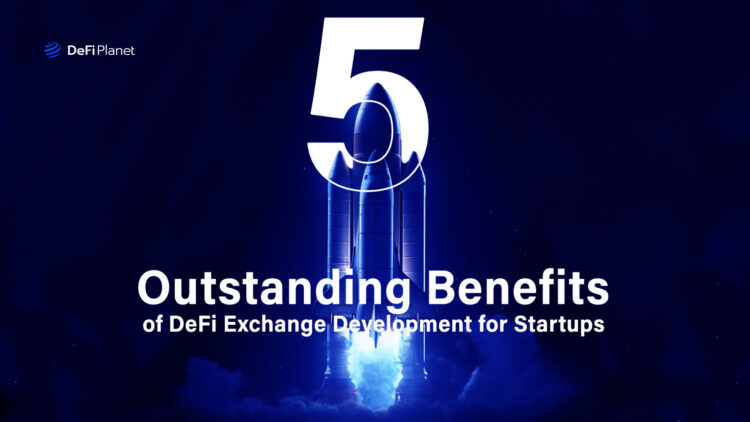The emergence of decentralized finance (DeFi) exchanges in recent years has revolutionized the financial landscape. While traditional financial institutions grapple with a series of challenges, startups are increasingly turning to DeFi exchanges as a wellspring of innovation and opportunity.
With improved accessibility, reduced intermediaries, unparalleled liquidity, and programmable financial instruments, the development of DeFi exchanges holds the potential to inaugurate a fresh era of financial empowerment and inclusivity.
This article comprehensively explores the advantages of DeFi exchange development to startups.
What are DeFi Exchanges?

DeFi exchanges allow users to trade cryptocurrencies directly between themselves without the involvement of intermediaries like banks or brokers.
Unlike centralized exchanges that operate as custodians of users’ funds, DeFi exchanges allow users to own their private keys. This improves security and provides greater control over their assets.
The primary distinction between DeFi and centralized exchanges lies in their operation and architecture. Centralized exchanges hold users’ funds in custody, raising concerns about security breaches and potential single points of failure.
DeFi exchanges, on the other hand, run on blockchain networks, using smart contracts to automate trading and settlement processes, thus removing the need for a central authority.
Key Features and Functionalities of DeFi Exchanges
Automated Market Making (AMM)
Many DeFi exchanges use the AMM methodology, which depends on algorithms to set token pricing and facilitate trading. Users can supply liquidity to trading pairs by investing tokens in liquidity pools and earning returns in transaction fees.
Non-Custodial Trading
DeFi exchanges allow users to trade directly from their wallets rather than transferring funds to an exchange-controlled account. This non-custodial nature ensures that users retain control over their private keys and assets at all times.
Decentralized Order Books
Some DeFi exchanges use decentralized order book systems, which enable users to place limit and market orders directly on the blockchain without relying on a central organization to match orders.
Token Swapping
DeFi exchanges sometimes provide token-swapping services, allowing customers to immediately and directly transfer one cryptocurrency for another from their wallets.
Flash Loans
Flash loans allow users to borrow assets without requiring collateral, as long as the borrowed amount is repaid in the same transaction. These loans have prompted new developments in DeFi protocols and trading methods.
The Role of Smart Contracts in DeFi Exchanges
Smart contracts, which are self-executing code that runs on blockchain networks, are the foundation of DeFi exchanges. These contracts automate and enforce different functions, such as trade execution, transaction settlement, and fee distribution to liquidity providers.
DeFi exchanges use smart contracts to enable trustless and transparent operations because the code is open and verifiable by anyone on the blockchain.
Why Should Startups Develop Their DeFi Exchanges?
Startups that opt to develop their own DeFi exchange have a unique potential to excel in the fast-evolving cryptocurrency space and DeFi.
DeFi exchanges, utilizing smart contracts and blockchain technology as their foundation, offer numerous distinctive features that can benefit business owners. Here are the key advantages that startups can enjoy by embracing DeFi exchange development:
Accessibility and Inclusivity
Traditional financial systems typically exclude substantial segments of the global population, especially those who do not have access to regular banking services.
DeFi exchanges, on the other hand, run on blockchain networks and are available to anyone with an internet connection. This inclusivity allows entrepreneurs to reach a larger user base, expanding financial services to areas where traditional systems have restrictions.
Startups can engage with a diverse and unexplored market by enabling cross-border transactions and investments.
Decentralization and Security
Security breaches and single points of failure are risks associated with centralized exchanges. DeFi exchanges, on the other hand, are decentralized, with no central authority or mediator.
Transactions are validated via consensus mechanisms, which makes them resistant to hacking and reduces the possibility of system-wide failures. This increased security is crucial for startups in building trust and attracting customers who are cautious of security breaches that have afflicted the centralized exchange industry.
Reduced Intermediaries and Costs
Traditional financial transactions involve several intermediaries, each of which adds to the complexity and cost of the process. Most of these intermediaries are eliminated in DeFi transactions, streamlining the process and lowering costs.
Users benefit from decreased transaction fees, and startups benefit from operational savings. Startups can pass on these cost savings to their customers, increasing the attractiveness and competitiveness of their exchange in the market.
Innovation and Flexibility
Startups can experiment and innovate with new financial products and services thanks to DeFi exchanges. Since blockchain and smart contracts are programmable, entrepreneurs can develop complex trading methods, yield farming mechanisms, and innovative investment opportunities.
This adaptability allows startups to distinguish themselves by providing unique features and services that align with specific user demands, thereby increasing user engagement and loyalty.
Liquidity Opportunities
Liquidity pools are common features of DeFi exchanges. They allow users to lend, borrow, and earn interest on their holdings. Startups might profit from this feature by facilitating liquidity availability while earning from transaction fees.
Furthermore, startups can create their own tokens to encourage users to participate in the network through prizes and governance rights. These liquidity opportunities can help the exchange and the ecosystem as a whole grow.
How Can Startups Develop Their Own DeFi Exchange Platform?
Developing a DeFi exchange requires a well-structured approach that includes market research, technological stack selection, smart contract development, user experience design, compliance measures, among many other factors.
Here are the key steps entrepreneurs should take to develop a successful DeFi exchange:

Market Research and Analysis
Before you start developing a DeFi exchange, you must first properly research the market landscape and choose your target audience. Conduct extensive research to:
- Determine the categories of users you want to serve: traders, investors, liquidity providers, and so on. Recognize their needs, preferences, and pain points.
- Research existing DeFi exchanges to determine their strengths, shortcomings, and unique features. Keep up-to-date on the newest DeFi trends and breakthroughs.
Technology Stack Selection
The selection of the appropriate technological stack is critical for a successful DeFi exchange. Consider the following tips:
- Determine which blockchain platform is best suited to your exchange’s requirements: Ethereum, Binance Smart Chain, Polygon, etc.
- Choose a protocol for token standards (for example, ERC-20 or BEP-20) and functions.
- Select programming languages (e.g., Solidity for Ethereum) and development tools that correspond to your technical expertise.
Smart Contract Development and Auditing
Smart contracts serve as the foundation of a DeFi exchange, allowing for secure and automated transactions:
- Develop smart contracts for trade, liquidity provision, and other purposes using best practices to reduce vulnerabilities and increase efficiency.
- Collaborate with reputable security assessment services to discover and rectify potential security flaws in your smart contracts.
- Smart contract auditing is essential to prevent hacks or exploits.
User Experience (UX) Design
Ensure you create an intuitive and seamless user experience for user adoption and retention.
- Create user interfaces that are simple to use, responsive, and visually appealing.
- Make the user experience a priority in both the desktop and mobile editions.
- Make the trading process more efficient, from account opening and deposit to order placement and withdrawal.
- Provide real-time price data and order book details.
Compliance and Regulation
It is advisable to exhaustively explore the regulatory landscapes of your operational jurisdictions to ensure that your DeFi exchange complies with all legal requirements.
- Integrate anti-money laundering (AML) and know-your-customer (KYC) procedures to prevent illegal activities and ensure full compliance with legislation.
- If necessary, consider collaborating with compliance service providers.
- Consult legal specialists who are well-versed in blockchain and cryptocurrency regulations to ensure that your exchange adheres to the relevant laws in operational regions.
Testing and Deployment
Thorough testing and a flawless deployment process are required before going live with your DeFi exchange.
- Test all functionalities thoroughly, including trading, deposits, withdrawals, and security measures. Test for both functionality and security.
- Deploy your DeFi exchange on the blockchain platform of your choice.
- Ensure scalability and redundancy to meet user demand.
Liquidity Provision and Partnerships
A successful exchange requires liquidity. Consider the following tips for attracting liquidity providers:
- Establish incentivized liquidity pools where users can contribute funds and earn rewards.
- Create measures to balance the pools and prevent temporary losses.
- Work with other DeFi projects, liquidity providers, and market makers to increase liquidity and improve the overall trading experience.
Challenges of DeFi Exchanges
While the emergence of DeFi exchanges offers significant potential for businesses, it is not without its challenges. As businesses embark on building their own decentralized trading platforms, it’s important to be aware of potential hurdles and devise strategies to overcome them.
Regulatory Landscape
Various countries have adopted differing stances on cryptocurrencies, blockchain technology, and decentralized money.
Navigating the intricate regulatory framework is one of the most formidable challenges for startups in the DeFi exchange industry. While the decentralized structure of these platforms provides freedom and accessibility, it could potentially clash with established financial regulations.
Solution: Startups must be well-versed in local laws and regulations to ensure compliance with AML and KYC protocols. Collaborate with legal specialists and stay up-to-date on new regulations to avoid legal entanglements and reputational hazards.
Smart Contract Vulnerabilities
Smart contracts ensure automated and trustless transactions. However, they are not immune to vulnerabilities and coding errors. Even seemingly minor coding mistakes might lead to devastating losses.
The high-profile smart contract attacks in the DeFi ecosystem serve as a stark reminder of the necessity for robust security measures.
Solution: Smart contracts that govern trading, liquidity provision, and yield farming need to be thoroughly tested and verified. Startups must also allocate resources for comprehensive code reviews and external audits to identify and mitigate risks before launching their DeFi exchanges.
Market Competition
The landscape is becoming increasingly competitive as DeFi (decentralized finance) becomes more popular. New companies are entering the market with fresh concepts, hoping to stand out and gain market share.
Standing out from the crowd requires not only a unique value proposition but also a firm grasp of user preferences and trends.
Solution: Startups should focus on providing unique products, user-centric experiences, and efficient marketing techniques. They can also achieve a competitive advantage by building robust alliances and communities.
Interoperability and Scalability
Interoperability between different blockchain networks and platforms is crucial for DeFi trading. The ability to interface seamlessly with diverse assets and protocols improves the user experience and expands the scope for creativity.
Furthermore, as DeFi attracts public attention, scalability becomes a significant challenge. Many blockchain networks face scalability challenges due to high transaction fees and network congestion during peak hours.
Solution: To ensure efficient and cost-effective operations, startups must choose blockchain platforms that prioritize scalability and also explore Layer 2 solutions.
Security and Custodianship
The decentralized nature of DeFi exchanges emphasizes user custody of funds. While this gives users authority over their assets, it also places the responsibility for security squarely on their shoulders.
Solution: Startups should educate users about recommended practices for safeguarding their private keys and deploying hardware wallets. DeFi exchanges can also offer increased security features such as multi-factor authentication and withdrawal whitelists to help users protect their accounts from intrusions.
Case Studies: Successful DeFi Exchange Startups
Here are examples of successful DeFi exchange startups that have built a name for themselves in the industry:
Uniswap

Uniswap is widely recognized for popularizing the concept of AMMs (Automated Market Makers), which enable the decentralized and algorithmic pricing of trading pairs.
Launched in 2018, Uniswap operates on the Ethereum blockchain and permits users to trade various tokens without relying on intermediaries. Its simple interface and seamless token exchange experience have significantly contributed to its widespread adoption.
The success of Uniswap can be attributed to its innovative AMM concept, which enables users to provide liquidity to multiple trading pairs in exchange for fees. Uniswap has constructed a self-sustaining environment that facilitates efficient and decentralized trading by incentivizing liquidity providers.
SushiSwap

SushiSwap emerged in 2020 as a major fork of Uniswap, intending to expand on the existing DeFi exchange features. The platform began as a clone but quickly added new features and governance methods to differentiate itself.
One of its distinctive innovations is the “yield farming” feature, which compensates users for providing liquidity with its native SUSHI coins.
SushiSwap’s ability to iterate on existing ideas and provide new services has proven popular with users, resulting in the protocol’s rapid development. The project’s community-driven decision-making and development methods have also contributed to its long-term success.
PancakeSwap

PancakeSwap stands out as an excellent example of a DeFi exchange employing an alternative blockchain to achieve enhanced scalability. The protocol debuted on the Binance Smart Chain (BSC), offering reduced transaction costs and faster confirmation times compared to the Ethereum network.
The deliberate decision to build on BSC attracted users looking for a more effective trading experience.
The success of PancakeSwap on BSC demonstrates the need to address blockchain scalability and cost-effectiveness when developing DeFi exchanges. PancakeSwap gained a large user base by eliminating the challenges associated with network congestion and exorbitant prices.
To Sum Up
The development of DeFi exchanges can democratize finance by allowing startups to reshape a more inclusive and open financial environment. Startups must approach this market with a blend of technological prowess, audacious innovation, and respect for regulatory norms.
By doing so, startups can take advantage of the numerous opportunities that DeFi offers, thus propelling both their businesses and the industry to unprecedented heights.
Further research can explore the regulatory considerations for startups, the comparative analysis of different DeFi exchange models, the potential environmental impacts of decentralized financial models on startups, and the security measures to mitigate risks.
Understanding these areas will help startups navigate the ever-evolving DeFi landscape and leverage it for long-term success.
DISCLAIMER: This piece is intended solely for informational purposes and should not be considered trading or investment advice. Nothing herein should be construed as financial, legal, or tax advice. Trading or investing in cryptocurrencies carries a considerable risk of financial loss. Always conduct due diligence.
If you would like to read more articles like this, visit DeFi Planet and follow us on Twitter, LinkedIn, Facebook, Instagram, and CoinMarketCap Community.
“Take control of your crypto portfolio with MARKETS PRO, DeFi Planet’s suite of analytics tools.”





















